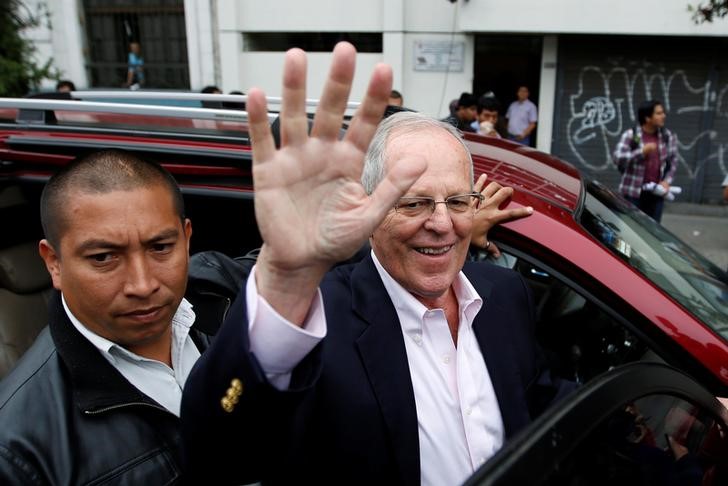LIMA (Reuters) - Peru's centrist presidential hopeful Pedro Pablo Kuczynski cancelled plans to take part in a rally against his rival Keiko Fujimori on Tuesday, in a last-minute U-turn that could reinforce a view he is indecisive ahead of Sunday's vote.
Tens of thousands of Peruvians marched in downtown Lima to protest Fujimori's candidacy, calling the centre-right frontrunner a threat to democracy and the embodiment of the authoritarian government of her father Alberto Fujimori, who is now in prison for corruption and human rights abuses.
Kuczynski, a 77-year-old former World Bank economist who endorsed Fujimori during her first presidential run in 2011, said it would be "undemocratic" for him to join calls to stop Fujimori.
"I think the march is just, its principles are just, but if I go it will look like I don't want this election to happen, and I think that would be wrong of me," Kuczynski said in broadcast comments from a press conference hours after announcing he would attend the protest.
While the move may help Kuczynski win over conservative voters wary of protests, it might also alienate him from Fujimori's hard-core opponents or broaden the view that he is not firm enough to be president.
Fujimori, who portrays herself as the strongest candidate to tackle crime, has taken the lead over Kuczynski in the past week despite a scandal involving a senior aide accused of having links to drug trafficking and money laundering.
Fujimori has defended her aide and said both are victims of a smear campaign to keep her from power. An Ipsos poll on Sunday showed her winning the election with 53 percent support.
"She is still covering up for the protagonists of corruption," said Carmen Pretel, a 52-year-old psychologist who took part in the anti-Fujimori rally. "I don't think she's changed at all."
At least 40,000 activists marched in the rally, according to a Reuters witness. Banners in favour of Kuczynski were scarce amid a flood of signs that read "Fujimori never again" and "No to the narco-state!"
A protest held at the same stage of the first-round race helped dent support for Fujimori, who nevertheless came in first with a double-digit lead over runner-up Kuczynski.
Kuczynski has said he endorsed Fujimori in 2011 in a bid to keep then-leftist Ollanta Humala from winning. Humala, once an ally of late Venezuelan President Hugo Chavez, has governed moderately and will hand over power on July 28.
